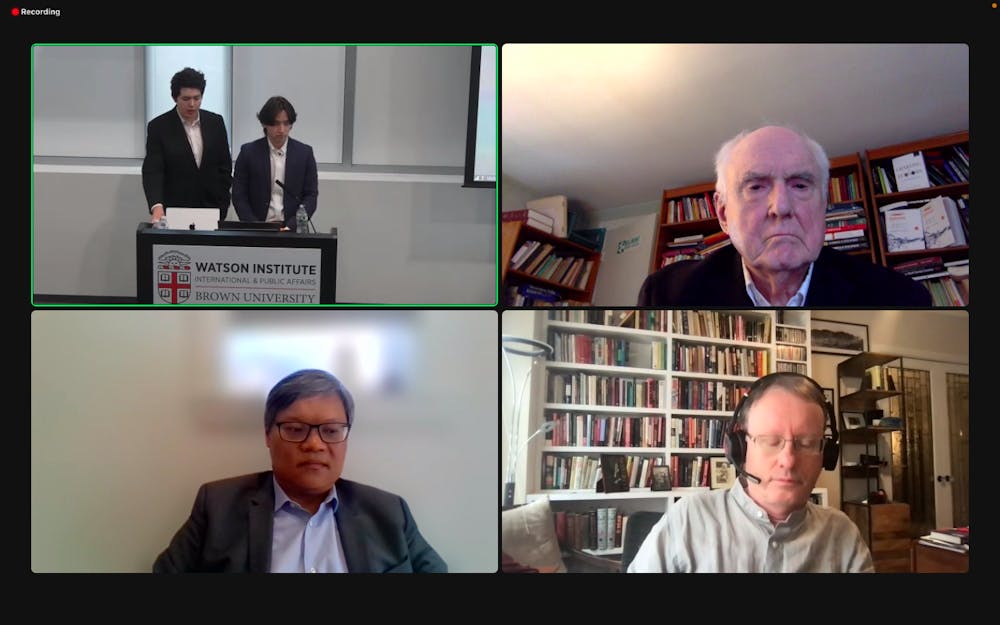The Brown China Summit — an annual conference that brings academics, business leaders and policymakers to the University to discuss critical issues relating to China — wrapped up its weekend lineup of events on Sunday.
This year’s conference, which began on Friday, April 17 with a keynote address by Robert Kuhn, was split into four distinct categories: future, entrepreneurship, humanity and political economy, according to the summit’s website. Most of the events were held as online Zoom webinars, though community members could gather to watch the webinars at the Stephen Robert ’62 Hall in the Watson Institute for International and Public Affairs.
Sunday’s programming began with a lecture and moderated Q&A with British historian and political scientist Rana Mitter, who spoke on Chinese conceptions of World War II.
“The Second World War still remains a very important part of the national culture” in countries across the world, Mitter said. “The continued collective social memory of the World War II experience is one … of the important tools, vehicles and narratives … that explains the ways in which contemporary international relations” are defined in China, he added.
Mitter explained that countries like China and the United States attempt to rewrite the political legacy of the war to legitimize the “burdens and sacrifices” they made during wartime, which he said represents their continuing competition over politics, economics and culture. World War II “broke out in full form” in China in 1937, before the other allied powers entered the war, according to Mitter.
Mitter concluded that this historical approach enables China to “make a bigger case that (it) should get certain concessions, both international and domestically, because of the sacrifice that it made back in the 1940s.” As a result, “the Second World War has become a source of good war in terms of the imaging projects for the China of today,” he added.
The current Chinese leadership is “very keen to keep control of” the narrative which positions China as a central member of the United Nations in an effort to “create a present-day sense of unity and patriotism,” Mitter said.
Mitter’s “China’s Good War” lecture was followed by three other events that discussed US-China competition and the policy environment, journalistic relations and sustainable architecture in China.
The summit concluded with “Innovation & Reinvention: What Does the China Model Look Like in the 2020s,” a panel discussion that included Dwight Perkins, professor of political economy at Harvard University; Victor Shih, a political economist at Northwestern University; and Arthur Kroeber, founder of the China-focused Gavekal Dragonomics research service.
The panel aimed to offer its attendees an understanding of China’s current and future economic and political models, according to the panel’s two moderators.
Kroeber opened the discussion by explaining that Chinese economic growth is motivated by “improvements in the labor force, increases in capital and increases in productivity.” In recent years, the trajectory of the labor force and capital has been “going into reverse, and … (the Chinese government’s) obsession with top-down control is not ideal for productivity growth,” he said.
China can address its simultaneous problems with productivity growth and a shrinking population by “simply increasing the retirement age, (which is) very low,” Perkins said. He added that as the number of unskilled job opportunities decreases, “what the industry and the economy (really will) need are highly skilled people.”
The panel also discussed the global economic and military repercussions of China’s potential involvement in the Russia-Ukraine conflict. “I think there’s a belief among many Chinese leaders that … the United States is hostile and they’re very powerful, but they’re also in decline,” Kroeber said. He explained that China’s alignment with Russia is an effort to erode the current U.S. global order in order to create more space for the two countries.
“From a long-term strategic perspective, it is hard to see this as anything other than a big mistake by China,” Kroeber added. “Its economic relationship with Russia … is very narrow and based on resources.
“Over a five to 10 year period, this (alignment) will probably come to be seen as a pretty major error of judgment,” he concluded.
At the same time, because of its shared border with Russia, China wants to avoid the possibility of Russia democratizing, Shih said. This creates a situation where Putin “can make bigger military gambles … knowing that financially, China’s going to come to its aid.”
“Rationally, I agree that China would not intervene in any way,” he added. “On the other hand, this (conflict) is a credible threat to China. … The situation is evolving, so I guess we’ll see.”
After the panel’s conclusion, the summit’s Co-Presidents Wendy Chen ’23 and Zoey Liu ’23 closed out the weekend by thanking the different groups that helped organize the conference.
“BCS is here to bring thoughts and inspirations to” you, Chen told audience members. “We look forward to seeing you all next year.”

Alex Nadirashvili was the managing editor of multimedia and social media for The Brown Daily Herald's 133rd Editorial Board. As a former University News editor, he covered faculty, higher education and student life, though his proudest legacy is The Brown Daily Herald TikTok account.





